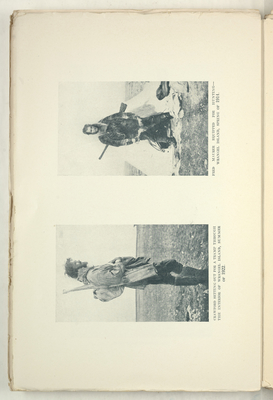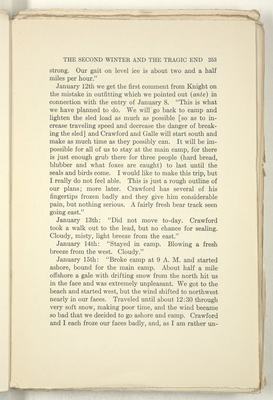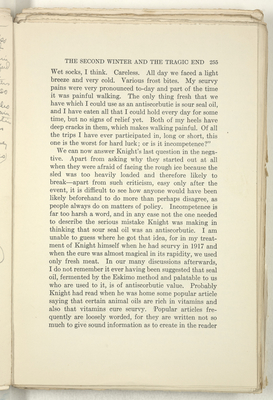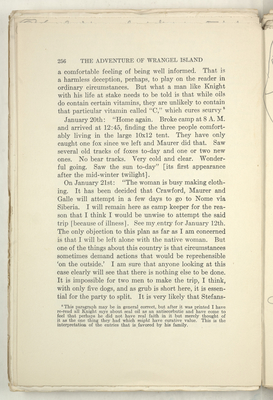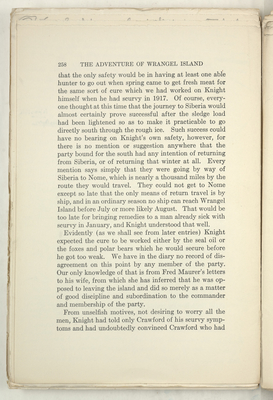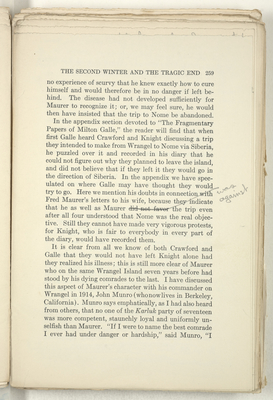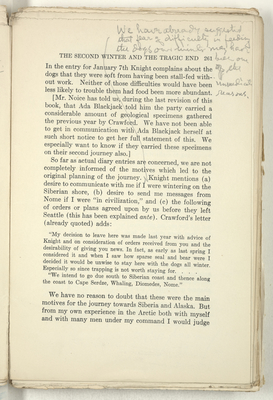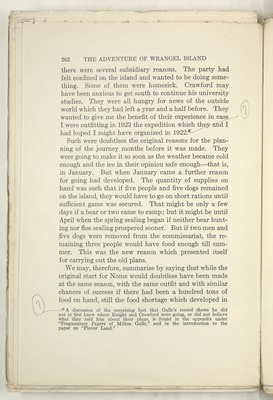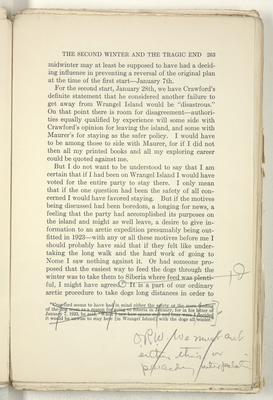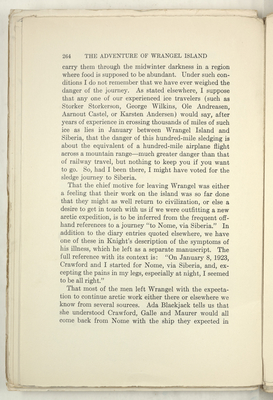Pages That Need Review
stefansson-wrangel-09-32
stefansson-wrangel-09-32-024v
CRAWFORD SETTING OUT FOR A TRAMP THROUGH THE INTERIOR OF WRANGEL ISLAND, SUMMER OF 1922.
FRED MAURER EQUIPPED FOR HUNTING-- WRANGEL ISLAND, SPRING OF 1914.
stefansson-wrangel-09-32-025r
THE SECOND WINTER AND THE TRAGIC END 253
strong. Our gait on level ice is about two and a half miles per hour.”
January 12th we get the first comment from Knight on the mistake in outfitting which we pointed out (ante) in connection with the entry of January 8. “This is what we have planned to do. We will go back to camp and lighten the sled load as much as possible [so as to increase traveling speed and decrease the danger of breaking the sled] and Crawford and Galle will start south and make as much time as they possibly can. It will be impossible for all of us to stay at the main camp, for there is just enough grub there for three people (hard bread, blubber and what foxes are caught) to last until the seals and birds come. I would like to make this trip, but I really do not feel able. This is just a rough outline of our plans; more later. Crawford has several of his fingertips frozen badly and they give him considerable pain, but nothing serious. A fairly fresh bear track seen going east.”
January 13th: “Did not move to-day. Crawford took a walk out to the lead, but no chance for sealing. Cloudy, misty, light breeze from the east.”
January 14th: “Stayed in camp. Blowing a fresh breeze from the west. Cloudy.”
January 15th: “Broke camp at 9 A.M. and started ashore, bound for the main camp. About half a mile offshore a gale with drifting snow from the north hit us in the face and was extremely unpleasant. We got to the beach and started west, but the wind shifted to northwest nearly in our faces. Traveled until about 12:30 through very soft snow, making poor time, and the wind became so bad that we decided to go ashore and camp. Crawford and I each froze our faces badly, and, as I am rather un-
stefansson-wrangel-09-32-026r
THE SECOND WINTER AND THE TRAGIC END 255
Wet socks, I think. Careless. All day we faced a light breeze and very cold. Various frost bites. My scurvy pains were very pronounced to-day and part of the time it was painful walking. The only thing fresh that we have which I could use as an antiscorbutic is sour seal oil, and I have eaten all that I could hold every day for some time, but no signs of relief yet. Both of my heels have deep cracks in them, which makes walking painful. Of all the trips I have ever participated in, long or short, this one is the worst for hard luck; or is it incompetence?” We can now answer Knight’s last question in the negative. Apart from asking why they started out at all when they were afraid of facing the rough ice because the sled was too heavily loaded and therefore likely to break—apart from such criticism, easy only after the event, it is difficult to see how anyone would have been likely beforehand to do more than perhaps disagree, as people always do on matters of policy. Incompetence is far too harsh a word, and in any case not the one needed to describe the serious mistake Knight was making in thinking that sour seal oil was an antiscorbutic. I am unable to guess where he got that idea, for in my treatment of Knight himself when he had scurvy in 1917 and when the cure was almost magical in its rapidity, we used only fresh meat. In our many discussions afterwards, I do not remember it ever having been suggested that seal oil, fermented by the Eskimo method and palatable to us who are used to it, is of antiscorbutic value. Probably Knight had read when he was home some popular article saying that certain animal oils are rich in vitamins and also that vitamins cure scurvy. 'Popular articles frequently are loosely worded, for they are written not so much to give sound information as to create in the reader
stefansson-wrangel-09-32-026v
256 THE ADVENTURE OF WRANGEL ISLAND
a comfortable feeling of being well informed. That is a harmless deception, perhaps, to play on the reader in ordinary circumstances. But what a man like Knight with his life at stake needs to be told is that while oils do contain certain vitamins, they are unlikely to contain that particular vitamin called “C,” which cures scurvy5
January 20th: “Home again. Broke camp at 8 A. M. and arrived at 12:45, finding the three people comfortably living in the large 10x12 tent. They have only caught one fox since we left and Maurer did that. Saw several old tracks of foxes to-day and one or two new ones. No bear tracks. Very cold and clear. Wonderful going. Saw the sun to-day” [its first appearance after the mid-winter twilight].
On January 21st: “The woman is busy making clothing. It has been decided that Crawford, Maurer and Galle will attempt in a few days to go to Nome via Siberia. I will remain here as camp keeper for the reason that I think I would be unwise to attempt the said trip [because of illness]. See my,entry for January 12th. The only objection to this plan as far as I am concerned is that I will be left alone with the native woman. But one of the things about this country is that circumstances sometimes demand actions that would be reprehensible ‘on the outside.’ I am sure that anyone looking at this case clearly will see that there is nothing else to be done. It is impossible for two men to make the trip, I think, with only five dogs, and as grub is short here, it is essential for the party to split. It is very likely that Stefans-
5 This paragraph may be in general correct, but after it was printed I have re-read all Knight says about seal oil as an antiscorbutic and have come to feel that perhaps he did not have real faith in it but merely thought of it as the one thing they had which might have curative value. This is the interpretation of the entries that is favored by his family.
stefansson-wrangel-09-32-027v
258 THE ADVENTURE OF WRANGEL ISLAND
that the only safety would be in having at least one able hunter to go out when spring came to get fresh meat for the same sort of cure which we had worked on Knight himself when he had scurvy in 1917. Of course, everyone thought at this time that the journey to Siberia would almost certainly prove successful after the sledge load had been lightened so as to make it practicable to go directly south through the rough ice. Such success could have no bearing on Knight’s own safety, however, for there is no mention or suggestion anywhere that the party bound for the south had any intention of returning from Siberia, or of returning that winter at all. Every mention says simply that they were going by way of Siberia to Nome, which is nearly a thousand miles by the route they would travel. They could not get to Nome except so late that the only means of return travel is by ship, and in an ordinary season no ship can reach Wrangel Island before July or more likely August. That would be too late for bringing remedies to a man already sick with scurvy in January, and Knight understood that well.
Evidently (as we shall see from later entries) Knight expected the cure to be worked either by the seal oil or the foxes and polar bears which he would secure before he got too weak. We have in the diary no record of disagreement on this point by any member of the party. Our only knowledge of that is from Fred Maurer’s letters to his wife, from which she has inferred that he was opposed to leaving the island and did so merely as a matter of good discipline and subordination to the commander and membership of the party.
From unselfish motives, not desiring to worry all the men, Knight had told only Crawford of his scurvy symptoms and had undoubtedly convinced Crawford who had
stefansson-wrangel-09-32-028r
THE SECOND WINTER AND THE TRAGIC END 259
no experience of scurvy that he knew exactly how to cure himself and would therefore be in no danger if left behind. The disease had not developed sufficiently for Maurer to recognize it; or, we may feel sure, he would then have insisted that the trip to Nome be abandoned.
In the appendix section devoted to “The Fragmentary Papers of Milton Galle,” the reader will find that when first Galle heard Crawford and Knight discussing a trip they intended to make from Wrangel to Nome via Siberia, he puzzled over it and recorded in his diary that he could not figure out why they planned to leave the island, and did not believe that if they left it they would go in the direction of Siberia. In the appendix we have speculated on where Galle may have thought they would try to go. Here we mention his doubts in connection with Fred Maurer’s letters to his wife, because they indicate that he as well as Maurer was against the trip even after all four understood that Nome was the real objective. Still they cannot have made very vigorous protests, for Knight, who is fair to everybody in every part of the diary, would have recorded them.
It is clear from all we know of both Crawford and Galle that they would not have left Knight alone had they realized his illness; this is still more clear of Maurer who on the same Wrangel Island seven years before had stood by his dying comrades to the last. I have discussed this aspect of Maurer’s character with his commander on Wrangel in 1914, John Munro (whonowlives in Berkeley, California). Munro says emphatically, as I had also heard from others, that no one of the Karluk party of seventeen was more competent, staunchly loyal and uniformly unselfish than Maurer. “If I were to name the best comrade I ever had under danger or hardship,” said Munro, “I
stefansson-wrangel-09-32-029r
[handwritten] We have already suggested that fear of difficulty in feeding the dogs our [winter] may have been one of the [unmedicate] reasons. THE SECOND WINTER AND THE TRAGIC END
In the entry for January 7th Knight complains about the dogs that they were soft from having been stall-fed without work. Neither of those difficulties would have been less likely to trouble them had food been more abundant.
[Mr. Noice has told us, during the last revision of this book, that Ada Blackjack told him the party carried a considerable amount of geological specimens gathered the previous year by Crawford. We have not been able to get in communication with Ada Blackjack herself at such short notice to get her full statement of this. We especially want to know if they carried these specimens on their second journey also.]
So far as actual diary entries are concerned, we are not completely informed of the motives which led to the original planning of the journey. Knight mentions (a) desire to communicate with me if I were wintering on the Siberian shore, (b) desire to send me messages from Nome if I were “in civilization,” and (c) the following of orders or plans agreed upon by us before they left Seattle (this has been explained ante). Crawford’s letter (already quoted) adds:
“My decision to leave here was made last year with advice of Knight and on consideration of orders received from you and the desirability of giving you news. In fact, as early as last spring I considered it and when I saw how sparse seal and bear were I decided it would be unwise to stay here with the dogs all winter. Especially so since trapping is not worth staying for. . . .
“We intend to go due south to Siberian coast and thence along the coast to Cape Serdze, Whaling, Diomedes, Nome.”
We have no reason to doubt that these were the main motives for the journey towards Siberia and Alaska. But from my own experience in the Arctic both with myself and with many men under my command I would judge
stefansson-wrangel-09-32-029v
262 THE ADVENTURE OF WRANGEL ISLAND
there were several subsidiary reasons. The party had felt confined on the island and wanted to be doing something. Some of them were homesick. Crawford may have been anxious to get south to continue his university studies. They were all hungry for news of the outside world which they had left a year and a half before. They wanted to give me the benefit of their experience in case I were outfitting in 1923 the expedition which they and I had hoped I might have organized in 1922. 7
Such were doubtless the original reasons for the planning of the journey months before it was made. They were going to make it so soon as the weather became cold enough and the ice in their opinion safe enough—that is, in January. But when January came a further reason for going had developed. The quantity of supplies on hand was such that if five people and five dogs remained on the island, they would have to go on short rations until sufficient game was secured. That might be only a few days if a bear or two came to camp; but it might be until April when the spring sealing began if neither bear hunting nor floe sealing prospered sooner. But if two men and five dogs were removed from the commissariat, the remaining three people would have food enough till summer. This was the new reason which presented itself for carrying out the old plans.
We may, therefore, summarize by saying that while the original start for Nome would doubtless have been made at the same season, with the same outfit and with similar chances of success if there had been a hundred tons of food on hand, still the food shortage which developed in
7 A discussion of the surprising fact that Galle’s record shows he did not at first know where Knight and Crawford were going, or did not believe what they told him about their plans, is found in the appendix under “Fragmentary Papers of Milton Galle,” and in the introduction to the paper on “Plover Land.”
stefansson-wrangel-09-32-030r
THE SECOND WINTER AND THE TRAGIC END 263
midwinter may at least be supposed to have had a deciding influence in preventing a reversal of the original plan at the time of the first start—January 7th.
For the second start, January 28th, we have Crawford’s definite statement that he considered another failure to get away from Wrangel Island would be “disastrous.” On that point there is room for disagreement—authorities equally qualified by experience will some side with Crawford’s opinion for leaving the island, and some with Maurer’s for staying as the safer policy. I would have to be among those to side with Maurer, for if I did not then all my printed books and all my exploring career could be quoted against me.
But I do not want to be understood to say that I am certain that if I had been on Wrangel Island I would have voted for the entire party to stay there. I only mean that if the one question had been the safety of all concerned I would have favored staying. But if the motives being discussed had been boredom, a longing for news, a feeling that the party had accomplished its purposes on the island and might as well leave, a desire to give information to an arctic expedition presumably being outfitted in 1923—with any or all these motives before me I should probably have said that if they felt like undertaking the long walk and the hard work of going to Nome I saw nothing against it. Or had someone proposed that the easiest way to feed the dogs through the winter was to take them to Siberia where feed was plentiful, I might have agreed. It is a part of our ordinary arctic procedure to take dogs long distances in order to
stefansson-wrangel-09-32-030v
264 THE ADVENTURE OF WRANGEL ISLAND
carry them through the midwinter darkness in a region where food is supposed to be abundant. Under such conditions I do not remember that we have ever weighed the danger of the journey. As stated elsewhere, I suppose that any one of our experienced ice travelers (such as Storker Storkerson, George Wilkins, Ole Andreasen, Aarnout Castel, or Karsten Andersen) would say, after years of experience in crossing thousands of miles of such ice as lies in January between Wrangel Island and Siberia, that the danger of this hundred-mile sledging is about the equivalent of a hundred-mile airplane flight across a mountain range—much greater danger than that of railway travel, but nothing to keep you if you want to go. So, had I been there, I might have voted for the sledge journey to Siberia.
That the chief motive for leaving Wrangel was either a feeling that their work on the island was so far done that they might as well return to civilization, or else a desire to get in touch with us if we were outfitting a new arctic expedition, is to be inferred from the frequent offhand references to a journey “to Nome, via Siberia.” In addition to the diary entries quoted elsewhere, we have one of these in Knight’s description of the symptoms of his illness, which he left as a separate manuscript. The full reference with its context is: “On , Crawford and I started for Nome, via Siberia, and, excepting the pains in my legs, especially at night, I seemed to be all right.”
That most of the men left Wrangel with the expectation to continue arctic work either there or elsewhere we know from several sources. Ada Blackjack tells us that she understood Crawford, Galle and Maurer would all come back from Nome with the ship they expected in
